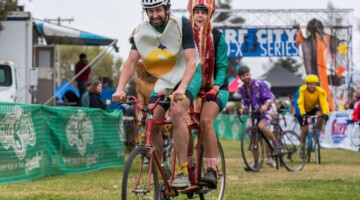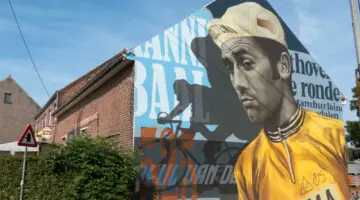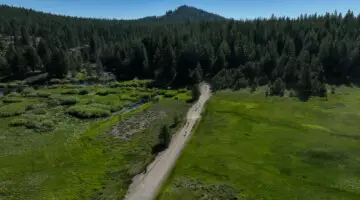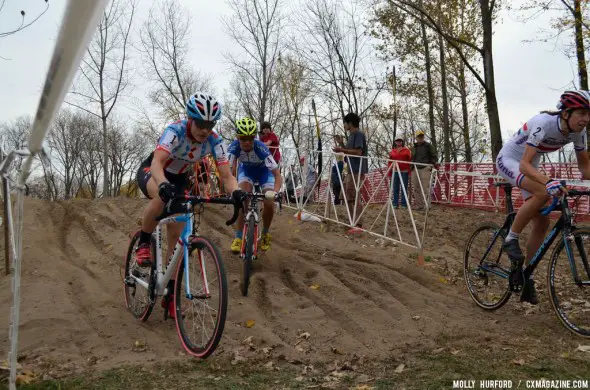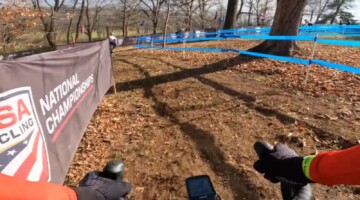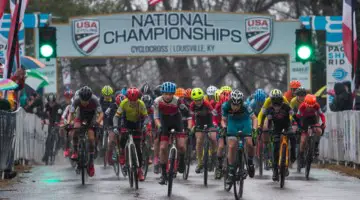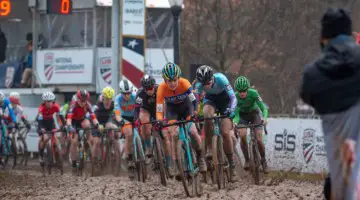You may have read the first installment of our “What’s Happening to the USGP Races?” Series a couple of weeks ago, and as promised, we’re running the interviews that we had with each of the individual race promoters of the four race weekends formerly associated with the series. First up, we heard from Brad Ross of the USGP in Bend at the Deschutes Brewery. Today, we’re hearing from Joe Czerwonka from the Louisville Derby City Cup race, now the Sophisticated Living Derby City Cup, part of the OVCX Series.
Cyclocross Magazine: Were you surprised by the news that the USGP wouldn’t continue as a series? What was your initial reaction?
Joe Czerwonka: It was very disappointing news, especially since the announcement was made just two months after Worlds. But despite the momentum from that event, I knew there would still be some significant financial hurdles to overcome for the USGP heading into this season. Last year the series was fortunate enough to have some really great sponsors step up after its title sponsor failed to honor it’s financial obligations, but that was a one year deal. Still, I thought if anyone could pull it off, Joan and Bruce could, so I remained hopeful. It was a tough call for them I’m sure, but I think they ultimately made the right decision.
On a person level, I’ll miss the family vibe of the staff and local race crews, and all the racers and team support who made it a point each year to hit all the USGP’s.
CXM: As of now, will you still be hosting the race? Will you still have a C1 race?
JC: The community support in Louisville has been outstanding since Worlds, and awareness for the sport is through the roof, so there’s no possible way we could not host this race and build on that. It’ll be a C1 on Saturday, C2 on Sunday, and it’ll still be very much up to the high standards that were set by the USGP. In fact, Keegan Schelling will be back as chief course designer, so you know it’ll be as pro as it gets.
One thing the USGP always stressed was the importance of equal payouts for elite men and women, and we’re planning on offering equal prize money a minimum of 10 deep for elite women both days.
CXM: How did being a USGP race affect your finances and sponsorships in past years? What alternative plans have you started to make?
JC: Joan and Bruce have always handled the business end of this race, so I can’t personally speak for the financial and sponsorship impact of the past years. We have a new title sponsor for 2013, Louisville-based Sophisticated Living Magazine, and it’s been an incredibly positive experience working with them on this race. The owner is also an avid cyclist who also supports a growing club (and race) team here in Louisville.
As far as any alternative plans, we’ve primarily been working to transition the race into a truly unique event that can stand on it’s own legs, post-Worlds. In addition, establishing roots in the community is very important to us. We realize how critical it is to build strong ties with the teams, clubs, and shops here, as well as local businesses and government, in order to keep this premier event going strong in Louisville. It’s great to say “Worlds was here,” but I’m just as excited to say “the Sophisticated Living Derby City Cup is here.”
CXM: What’s the tentative plan for the 2013 race?
JC: The USGP did do a lot of things right, especially in course design and production. So we plan on using the previous USGP course a template to work from, as it has been part of the series for years now and we here in Louisville know the drill. I’d love to run the Saturday race under lights, but we’ll see.
Also, we’re excited to be a part of the Zipp Ohio Valley CX Series again this season. It’s such a well-run series, and I’m confident that numbers will only be stronger this year. Plus, within a three-week period, there’s a Series race at Eva Bandman, the UCI3 weekend in Cincinnati (also part of the Series), then it’s back to Bandman for the Derby City Cup C1 weekend.
CXM: What kind of communication have you had with USA Cycling or the UCI since the USGP series was canceled?
JC: USAC has been very supportive of the move, but they certainly needed to be assured that we could logistically pull off a C1, and I think the UCI was in the same boat. They’re maybe a little gun-shy from Worlds, and I can see where they’re coming from. I’ve been on staff with the USGP for the past three seasons, which works out to 24 UCI races, half of which were C1’s, and that’s not including other events I do throughout the year. I’m looking forward to heading up a C1 here in Louisville.
CXM: What kind of communication have you had with other USGP race promoters? What kind of ideas have you tossed around about potentially keeping the races together or unified?
JC: We haven’t had a ton of communication with each other, but there’s nothing to that. We have nothing but love for each other. I’m sure I’ll get some calls soon though, when they realize I still have all their stakes from Worlds here.
I do think it’s a little late in the game this season to try to join forces to revive the series, but we’re all on great terms, so that’s something we can discuss down the road. Right now, we’re just focusing on our individual races and making sure we keep our C1’s up to the high standards set by the USGP.
CXM: What do you think that the lack of a national series means for cyclocross in the US?
JC: First of all, I think the decision to discontinue the USGP is by no means an indicator of the health of cyclocross in the US. The sport continues to see significant growth in the US in terms of participation (even the USGP consistently grow it’s numbers over previous years), and that will continue regardless of a national series.
While I think there’s very little impact at the amateur level (as it was impractical for most amateur racers to do all USGP events), the professional and sponsorship sides took a hit in my opinion. There was a level of national exposure the USGP provided for elite athletes, so much so that some teams focused primarily on USGP races. I think without a national series, some teams may not have those must-do races on their calendar. Either way though, there’s a great race just about every weekend, and there are still the same number of C1 races as before.
The series brought a great deal of value to its sponsors because of it’s large national reach, so I think not having that demographic to tap into, larger sponsors looking to go big in the sport might not see the same opportunity to do that without a national series.
CXM: Do you think another national series will come into being in future years? What is the importance of having a national series?
JC: I would put my money on a national series being formed as soon as next season. It’s a little late for us to put the pieces back together this year, but I truly see value in a national series. Well, I should say, a well-run national series.
It’ll always be a challenge to do a national series, though, simply because of the geography. It’s not like Europe. Transportation costs are very high (for both the promoter, its vendors and the racers/teams), and that makes it prohibitive for all but the top supported racers to do a national series. A lot of really good teams in the US don’t have big budgets, and I’m sure for the ones that did all four USGPs, it was a large part of the annual expenses.
Again though, a national series does add significant value to the sport in terms of media exposure and sponsorship opportunities, and it does a great job of showcasing top athletes on a national level.
CXM: Was it rewarding being part of the USGP? Why (or why not)?
JC: Being a part of the USGP was a unique experience, and I’m grateful I was a part of making that event happen, and for the people I’ve met over the past few seasons.
The most rewarding part, as cheesy as it sounds, was just seeing racers have a great time on courses I had a hand in making. That’s as simple as I can explain it.
CXM: After being in Louisville, and helping run the SSCX Derby and seeing Worlds, what did you learn, from a promoter standpoint?
JC: Ha, those two events couldn’t have been more opposite. But hey, both were covered by Sporza! The SSCX Derby was a great distraction from all the serious competition going on that week, and Worlds was of course, Worlds. I’m not going to pretend they were on the same level, but let’s just say Worlds did have some pretty big shoes to fill.
In terms of what I’ve learned from promoting the SSCX Derby, the other races I’ve done in the past and even looking at Worlds, I’ve always tried to bring a little bit more to the spectator experience, and I think a little bit of creativity goes a long way. I plan on continuing that with Sophisticated Living Derby City Cup. It also helps to have a good brain trust to refer to, and I’ve learned to listen to them. No idea is off the table. It’s very important to present a race in such a way that someone who’s never heard of cyclocross can get excited about it and have a great time at the event.





